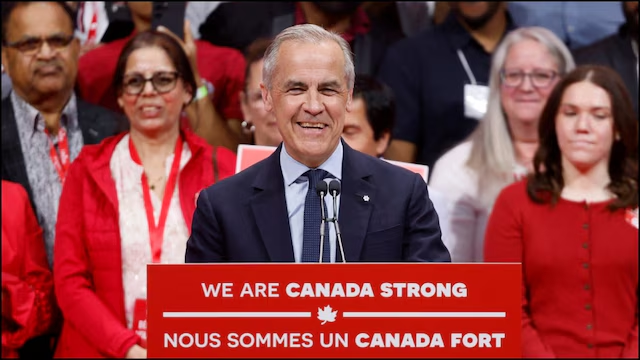In a fiercely contested election shaped by trade tensions with the United States and a late surge of Liberal support, Mark Carney’s Liberal Party has managed to cling to power, forming a minority government in Canada’s 343-seat House of Commons. (Canada)
According to results reported (News18, Reuters), the Liberals have secured around 163 seats, narrowly ahead of the Conservatives’ 146. A majority in Canada requires 172 seats, so Carney will now attempt to govern without an outright mandate.
This political survival comes after Carney replaced the deeply unpopular Justin Trudeau just last month — a strategic change orchestrated to revive the Liberals’ fortunes. While Carney lacked Trudeau’s baggage, the broader establishment machinery backing Liberal policies remained intact.
A Change of Face, Not of Policy
For India, there is little reason for celebration. While Trudeau’s departure removes a particularly hostile figure, the Liberal Party’s ideological posture toward India — especially on issues like Khalistan — is unlikely to change significantly under Carney.
Historically, the Liberals have allowed Khalistani sympathizers significant political space in Canada, often under the guise of “freedom of expression.” Given Carney’s complete reliance on left-leaning coalitions and voter bases, his government is expected to quietly maintain the same anti-India biases.
Conservatives Failed Too: No Real Option for Indian-Origin Voters
Moreover, the Conservative Party, which many Indians might have seen as an alternative, failed to build a clear pro-India outreach. Despite expectations, Conservatives too became entangled with Khalistani elements, especially in key candidate nominations — a failure that alienated large sections of Indian-origin voters.
In fact, many Indians either wasted their votes on smaller parties like the PPC, stayed home in disgust, or reluctantly shifted to the Liberals, who ironically fielded fewer Khalistani-linked candidates compared to the Conservatives.
Thus, even a Conservative victory would not have guaranteed a fundamental shift in Canada’s attitude toward India. The brutal fact remains: both major parties continue to have significant vulnerabilities to anti-India influences.
NDP’s Collapse: A Message from the Canadian Public
One silver lining is the resounding defeat of Jagmeet Singh’s New Democratic Party (NDP). Singh, who frequently amplified Khalistani propaganda internationally, saw his party reduced to just 8 seats (News18), losing official National Party status. Jagmeet Singh himself lost his seat and is set to resign as NDP leader.
This humiliation for the pro-Khalistan political lobby indicates that ordinary Canadians are increasingly uncomfortable with extremist elements operating within their borders. However, the NDP still retains some presence, suggesting that while the radical fringe has shrunk, it hasn’t disappeared.
India Must Remain Wary of Canada
The new face of Canadian politics does little to change India’s strategic calculations:
-
Diplomatic engagement will remain cautious, especially around issues of Khalistani extremism.
-
Expect less public grandstanding against India compared to Trudeau’s performative antics, but behind-the-scenes hostility may persist.
-
Leftist ideological leanings in Canada’s power centers ensure that India remains viewed through a skeptical, sometimes unfriendly lens.
Trump Factor: New Tensions Brewing? in Canada
The new Liberal minority government also faces a hostile environment with Washington. With Donald Trump back in the White House and Canada leaning hard left, bilateral tensions between the U.S. and Canada are inevitable. This could distract Carney’s government — but it also means Canada might double down on virtue signaling to maintain international relevance, including around issues sensitive to India.
Deep State Triumph: Same Wine, New Bottle
While Mark Carney may appear new and untested, his sudden elevation and surprise victory reflect how the global Deep State quickly adapted to salvage its broader agenda. The face changed, but the underlying power structures remained untouched — ensuring continuity despite public discontent.
Final Thoughts on Canada
India must treat the new Canadian government with realism, not optimism.
The departure of Trudeau is symbolic, but it does not automatically mean better ties.
The Khalistan threat persists. The anti-India bias persists.
And until Canada decisively cleans house — not just cosmetically — India must remain cautious, firm, and vigilant.


